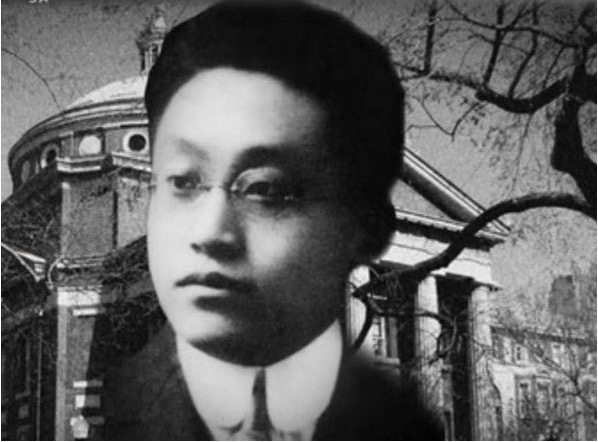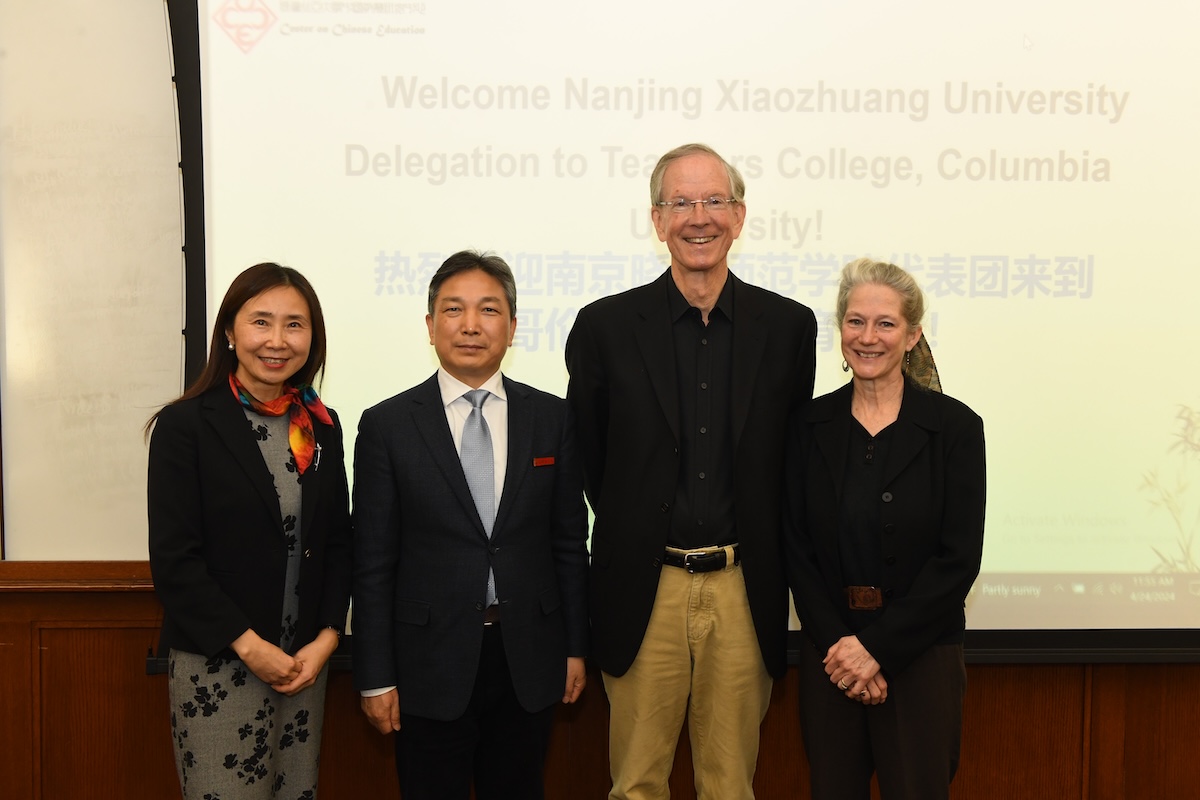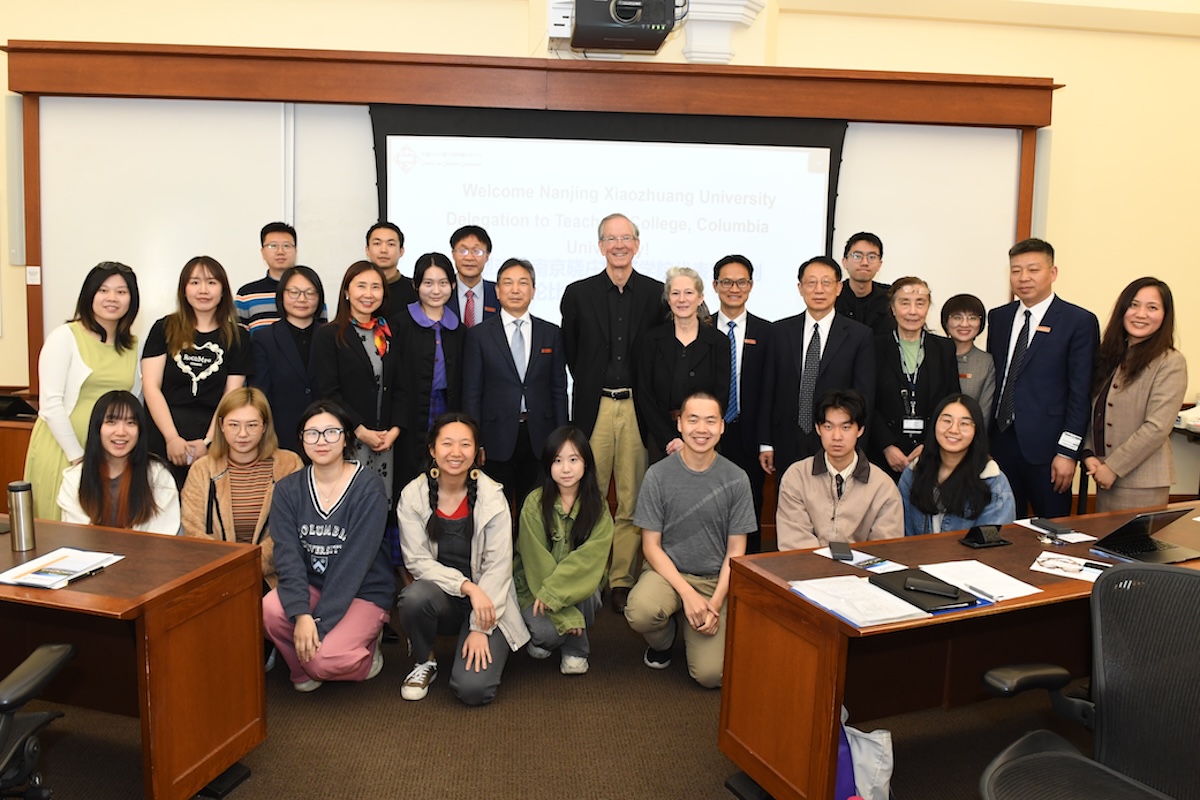Nearly 70 years after his death, Xingzhi Tao, a deeply influential scholar that revolutionized educational opportunities for rural Chinese citizens, has left an enduring impact not only on education in China, but on Teachers College, where he pursued doctoral studies from 1915-1917. He inspired his mentors — John Dewey, Paul Monroe, and William Kilpatrick — to pursue research on education in China and he continues to serve as inspiration to scholars today.
Those connections live on through in-depth research on education in China by TC scholars, and in the relationship between the College and Nanjing Xiaozhuang University (NJXZU), an institution founded by Tao that is educating future teachers in China. His philosophy, that education should be accessible to all, and legacy were recently honored with a symposium hosted by TC’s Center on Chinese Education (CoCE), the first of its kind at U.S. universities.
“Ultimately we want to make a contribution to mutual understanding and world peace,” said Henan Cheng, deputy director of TC’s Center on Chinese Education. “This [event] sent a message that we have to cooperate and respect [each other] to maintain peace.”
Representatives from TC, NJXZU and the Tao Xingzhi Memorial museum gave in-depth presentations on Tao’s approach to education, his lasting relationship to TC, and the legacy of NJXZU. Speakers included TC’s Henan Cheng; Jennifer Govan, Director and Senior Librarian of the Gottesman Library; and David Hansen, John L. & Sue Ann Weinberg Professor in Historical & Philosophical Foundations of Education, as well as Cehua Zhang, Chancellor of NJXZU and Professor of Law; Jizhou Zhang, Dean of Teacher Education at NJXZU; and Wenqiu He, Director of the Tao Xingzhi Memorial Museum in Nanjing, China.
Tao dedicated his life to making education more accessible
Born in Huang Tan Village, in Anhui Province, a rural part of eastern China, Tao struggled to access quality education and his experiences “endowed him with a village complex,'' according to Cehua Zhang, the chancellor of NJXZU. In practice, this meant that Tao devoted his life to educating the public, especially people in rural China.
To pursue his passion for education, Tao came to the U.S. to further his studies. Deeply influenced by the teachings of his mentors, Tao sought to combine “teaching, learning and practice in one” to transform education in China.
If we follow the guidance of Tao Xingzhi and focus on his wisdom, we too … can be the people’s educator.
Kan Tao, the great grandson of Xingzhi Tao
By the end of his life in 1946, Tao achieved his three wishes: founding the first school of education in China, constructing a school for orphans and disabled children and establishing a vocational school in Hong Kong. Tao was also instrumental in the development of an updated Thousand Character Classic, a book that made literacy more accessible to rural Chinese citizens and is still in use today.
When he left TC, Tao helped forge strong connections between the College and China
One of the most studied Chinese scholars, Tao and his legacy “built a bridge between Columbia and China,” explained Cheng, and this work started while he was a student. Though Tao was fiercely dedicated to his studies, he also served as president of the Chinese Education Research Association at Columbia, where he formed deep connections with other Chinese students.
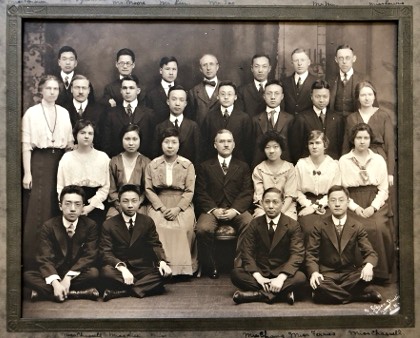
Photo of the Columbia China Education Research Association in 1916. Xingzhi Tao is in the middle of the second row from the top. (Photo: TC Archives)
After returning to China in 1917 in the midst of wars and social conflicts, Tao nurtured connections with his mentors, Dewey, Kilpatrick and Monroe who would go on to conduct in-depth research on the state of education in China, making multiple visits to the country and supporting Tao’s scholarly work. Tao worked alongside Monroe, conducting the first large-scale educational survey of China in 1921 and Kilpatrick made a visit to Xiaozhuang Experimental Rural Normal School, now NJXZU, expressing support and admiration for the new school.
Tao also served as Director of the China Education Improvement Society, which resulted in further collaboration with TC by inviting scholars like Will McCall and George Twist to conduct research in the country in 1921-24.
Tao’s research on Chinese education was the first of its kind
In 1924, Tao’s research was featured in TC’s first International Institute report, a groundbreaking publication that examined educational systems from around the world. This report was not only the first at TC but the first of its kind published in the United States. Tao’s contribution centered on the state of education in China at all levels.
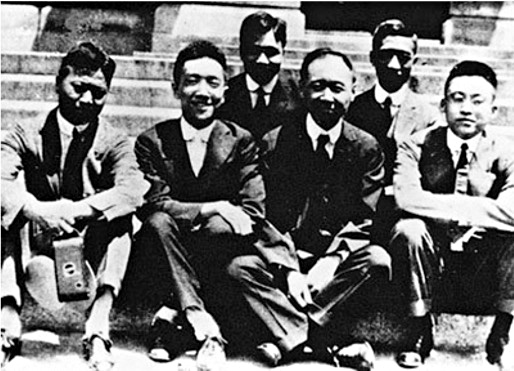
Xingzhi Tao (far right) with friends in 1917. (Photo: TC Archives)
Through his research, he found that, in the 1920s, roughly 80 percent of Chinese citizens lived in rural areas and that people in rural areas had low literacy rates, inspiring Tao’s focus on improving rural education. It was this emphasis on the needs of rural students that pushed Tao and his colleague, TC alum Shuyu Zhao, (M.A. ‘1924), to establish Xiaozhuang Experimental Rural Normal School.
Tao’s transformative education philosophy built upon John Dewey’s work
Building upon the philosophy of John Dewey, Tao believed that education should be modeled around the needs of society and that there shouldn’t be a barrier between schooling and broader society, a common belief in China at the time. Instead, Tao advocated for integrating teachers and students with their communities as well as combining research and practice.
Dewey and his philosophy came together with Tao’s philosophy of education and … the ideas they created definitely live on.
David Hansen, John L. & Sue Ann Weinberg Professor in Historical & Philosophical Foundations of Education.
This approach helped revolutionize education in China through innovative methods such as preparing students in rural schools to become teachers at home, helping to address education gaps for adults. Tao’s conviction that life is education was also a foundational principle when establishing NJXZU in 1927.
His legacy lives on through NJXZU and beyond
The establishment of NJXZU, the first institution of its kind in China, put Tao’s philosophy into practice. Over its 97 years, the university has prepared more than 200,000 educators to teach students in rural areas and beyond. The University is still guided by Tao’s philosophy of education for all and, according to Cehua Zhang, serves as a “cradle and wellspring of education in Modern China” by following a model of teaching and learning espoused by Tao who was in turn influenced by his mentors at TC.
“If we follow the guidance of Tao Xingzhi and focus on his wisdom, we too … can be the people’s educator,” said Kan Tao, the great grandson of Tao and director of the Shanghai Tao Xingzhi Memorial, at the symposium event.
